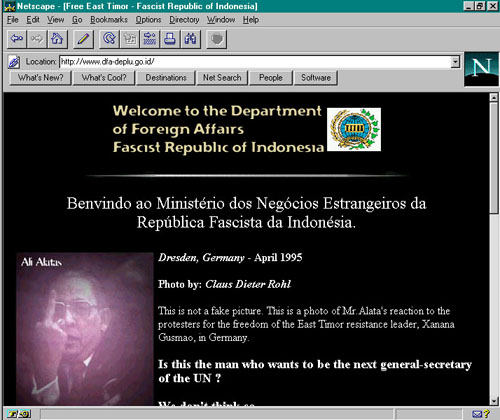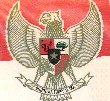
Senator Feingold's remarks in the 4 June 1997, Congressial Record.

Senator Feingold's remarks in the 4 June 1997, Congressial Record.
Mr. FEINGOLD. Mr. President, I rise today to draw the Senate's attention to the parliamentary elections that took place in Indonesia last Thursday, May 29.
Actually, it does not seem accurate to call this event an election since the polling was conducted amid worsening political repression and human rights abuses by the Indonesian Government. As in past elections, all candidates were prescreened and new political parties banned. Individuals who posed even the slightest challenge to President Suharto's power were not allowed to participate. We cannot mistake this process for a real election. Rather, it was a pitiful example of a brutal authoritarian Government attempting to masquerade as a democracy.
Clearly many in Indonesia are angry about not having a voice. This latest election was the most violent in 30 years. Rampant corruption among Indonesia 's ruling elite and continued high unemployment have created a deep vein of discontent. Yet Indonesians are given no choice other than Suharto, who already has ruled Indonesia for more than three decades.
Mr. President, the human rights situation in Indonesia remains as bad as ever. Five demonstrators were killed by troops last July after the Government engineered an attack on the office of an opposition party. In addition to the 5 dead, 23 protestors are still missing. Also last summer, labor leader Muchtar Pakpahan was arrested on trumped-up sedition charges. Mr. Pakpahan's only crime was to demand democracy, respect for human rights, and decent labor conditions.

The State Department's 1996 human rights report indicates that prisoners like Mr. Pakpahan frequently die at the hands of their interrogators. The report states that Indonesian `security forces continue to employ torture and other forms of mistreatment, particularly in regions where there were active security concerns, such as Irian Jaya, and East Timor. Police often resort to physical abuse, even in minor incidents.'
Indeed, the human rights situation in East Timor continues to be a matter of great concern. Since last Tuesday, as many as 41 people--both East Timorese citizens and Indonesian soldiers--have died in election-related violence. Unfortunately, such killings are a part of daily life in East Timor. Human rights monitors estimate that as many as 200,000 East Timorese have died under the Indonesian regime. Two hundred thousand. That represents a full third of East Timor's population before Indonesia invaded the former Portuguese colony back in 1975.
On the day before Indonesia 's election, East Timorese activist and co-winner of the 1996 Nobel Peace Prize Jose Ramos-Horta visited Washington. Mr. Ramos-Horta carried with him graphic evidence of human rights abuses that have occurred in East Timor in the last few months, evidence that includes disturbing photographs of Indonesian military officers torturing East Timorese detainees with electric shocks and lit cigarettes.
In his statement on the elections, Mr. Ramos-Horta notes that the unrest in East Timor is now spreading into Indonesia as people grow more frustrated with the existing political system. According to Mr. Ramos-Horta `a spiral of violence can be anticipated for Indonesia from now on as dissent grows. It will be met with the customary repression by the military-backed regime, now increasingly desperate as its grip on power begins to slip, leading to an extended period of instability, disruption to peace and much human suffering.'
I agree that the violence in Indonesia will only subside after President Suharto initiates real democratic change and, for example, allows all parties to compete equally in the political process.
However, like their counterparts in China, Indonesian authorities try to argue that greater democracy will lead to instability which in turn will impede economic development. I fundamentally reject this idea. Clearly, with so many Indonesians venting their anger against the present regime, the problem is not too much democracy, but too little. Just because President Suharto's government has boosted economic growth does not mean it has the right to murder and torture Indonesians and East Timorese.
Mr. President, the events of last week only further my discomfort regarding United States policy in Indonesia . As you know, the United States has supplied Indonesia with military training and weapons. Rather than aid Indonesia 's military, we should encourage the democratic forces within Indonesian society. As a world leader with great influence in Jakarta, the United States should work to convince Indonesia 's leaders that holding real elections, the kind that give people a true say in how they are governed, is a sign of national strength, not weakness.
U.S. Calls for a change. The state department called for a change in Indonesia's tightly controlled elections, spokesman John Dinger said: "The electoral system severely limits political competitions; Indonesian citizens do not have the ability to change their government through democratic means." (Washington Post, 31 May 1997)
Ruling Party Sweeps elections. Indonesia's ruling Golkar party kept its stranglehold on power by winning in a landslide it expected for a mostly ceremonial parliament. Critics of the government had been barred from running in the election, and independent observers and opposition figures charged that voters were intimidated and the ballot was rife with fraud. With 83.4 percent of the vote counted, Golkar had 76.4 million votes, or 74 percent of the 103.4 million ballots tabulated. The only other two other parties the government allowed to run in this election had just a fraction of that. The Muslim-oriented United Development Party got 23.9 million votes or 23 percent -- substantially better than in the last elections in 1992. The big loser was the Indonesian Democratic Party, deserted by supporters after the army had the popular pro-democracy leader Megawati Sukarnoputri removed last year as its chairwoman. It got only 3.1 million votes, or 3 percent. Prior to the ballot, Megawati announced she would protest by not voting at all. The Army had 130,000 troops on alert during the election. (AP, 30 May 1997)
130 die by fire in a pre election riot. The bodies of 130 people have been pulled from the ruins of a fashionable mall set ablaze during a pre-election riot on the island of Borneo, and officials said they expected to find more when the search resumed Monday. Officials said the bodies were those of looters trapped in the building during a final spasm of wild rioting Friday in Banjarmasin's commercial
district as fierce politicking degenerated into looting and random violence. More than 100 people were injured and nearly 200 people were arrested, most of them for looting, officials said. At least four others died in rioting elsewhere in the city. Officials also said that seven churches, eight shopping centers, 130 houses, 21 cars, 60 motorcycles, four government buildings and three hotels were damaged or destroyed in the violence that culminated with the fire at the four-story Mitra Plaza mall. As a result, a curfew had been ordered and troops are enforcing it. (CNN online, 25 May 1997)
Police Fire at rioters. Police fired rifles and tear gas at thousands of stone-throwing rioters in the streets of the Indonesian capital on the last day of a violent month of campaigning for parliamentary elections. Volleys of tear gas and warning shots were fired into the air to disperse the crowd as five military helicopters swooped overhead. Several armored vehicles equipped with water cannon arrived after the violence had subsided. Police confiscated videotapes and film from television cameramen and photographers who recorded police beating young protesters in several alleys. Complaints about restrictions on political activity, including a ban on opposition leader Megawati Sukarnoputri and her top supporters running for parliament have aggravated tensions. About 125 million Indonesians are eligible to vote in the election for 425 seats in the 500-member parliament. The other 75 seats are reserved for the military. Authorities say more than 80 people have been killed during the campaign. (AP, 23 May 1997)
